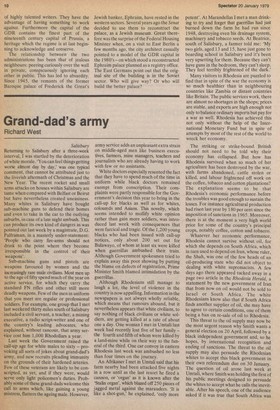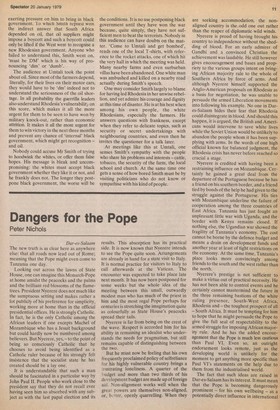Grand-dad's army
Richard West
Salisbury Returning to Salisbury after a three-week interval, I was startled by the deterioration of white morale. `You can feel things getting worse almost day by day,' was one typical comment, that cannot be attributed just to the liverish aftermath of Christmas and the New Year. The recent rocket and small arms attacks on houses within Salisbury are tame when compared with Belfast or Beirut but have nevertheless created uneasiness. Many whites in Salisbury have bought sub-machine guns to defend their homes and even to take in the car to the outlying suburbs, in case of a late night ambush. This can produce its own kind of dangers as was pointed out last week by a magistrate, D.G. Palframan, in a masterly under-statement: People who carry fire-arms should not drink to the point where they become irresponsible in the control of their weapons'.
Sub-machine guns and pistols are weapons favoured by women and the increasingly rare male civilians. Most men up to the age of fifty spend much of the year on active service, for which they carry the standard FN rifles and other still more deadly weapons. Few of the men in uniform that you meet are regular or professional soldiers. For example, one group that I met last weekend thirty miles south of Salisbury included a civil servant, a teacher, a mining executive, a radio script-writer and one of the country's leading advocates, who explained, without rancour, that army service cost him 1,000 Rhodollars a year.
Last week the Government raised the call-up age for white males to sixty — provoking all sorts of jokes about grand-dad's army, and new recruits pleading immunity on the grounds of their hardened arteries. Few of these veterans are likely to be conscripted, as yet, and if they were, would serve only light policemen's duties. Probably some of these grand-dads welcome this call to arms which, like gaining a young mistress, flatters the ageing male. However, army service adds an unpleasant extra strain on middle-aged men like business executives, farmers, mine managers, teachers and journalists who are already having to work with few or no assistants.
White doctors especially resented the fact that they have to spend much of the time in uniform while black doctors remained exempt from conscription. Their complaints were partly responsible for the Government's decision this year to bring in the call-up for blacks as well as for whites, coloureds and Asians. This novelty, which seems intended to mollify white opinion rather than gain more soldiers, was introduced last week with consequences that were farcical and tragic. Of the 1,200 young blacks who had been issued with call-up notices, only about 200 set out for Bulawayo, of whom at least six were killed when guerrillas ambushed their train. Although Government spokesmen tried to explain away this poor showing by putting the blame on defects of registration, Prime Minister Smith blamed intimidation by the guerrillas.
Although Rhodesians still manage to laugh a lot, the level of violence in the country is now appalling. Information in the newspapers is not always wholly reliable, which means that rumours abound, but it nevertheless appears that white civilians, to say nothing of black civilians or white soldiers, are getting killed at a rate of about one a day. One woman I met in Umtali last week had recently lost five of her family — the fourth and fifth of whom were killed by a land-mine while on their way to the funeral of the third. One car convoy in eastern Rhodesia last week was ambushed no less than four times on the journey.
An Afrikaner I met in Umtali said that his farm nearby had been attacked five nights in a row until as the last resort he fired a cannon, or `organ' as it is known after the `Stalin organ', which blazed off 250 pieces of jagged metal against the marauders. 'It is like a shot-gun,' he explained, `only more potent'. At Marandellas I met a man drinking to try and forget that guerrillas had just burned down the farm he had run since 1948, destroying even his drainage system, machinery and tobacco seeds. At Beatrice, south of Salisbury, a farmer told me: 'My two girls, aged 13 and 15, have just gone to boarding school in Salisbury and it's been very upsetting for them. Because they can't have guns in the bedroom, they can't sleep. They feel terribly frightened of the dark.'
Many visitors to Rhodesia are puzzled to find that in spite of the war the economy is so much healthier than in neighbouring countries like Zambia or distant countries like Britain. The public services work, there are almost no shortages in the shops; prices are stable, and exports are high enough not only to balance ordinary imports but pay for a war as well. Rhodesia has achieved this not only without the help of the International Monetary Fund but in spite of attempts by most of the rest of the world to wreck her economy.
The striking or strike-bound British should not need to be told why their economy has collapsed. But how has Rhodesia survived when so much of her agriculture has been destroyed by the war, with farms abandoned, cattle stolen or killed, and labour frightened off work on the coffee, tobacco and cotton plantations? The explanation seems to be that Rhodesia's economic performance before the troubles was good enough to sustain the losses. For instance agricultural production had risen last year by 180 per cent since the imposition of sanctions in 1965. Moreover, there is at the moment a very high world price for some of the country's principal crops, notably coffee, cotton and tobacco.
Whatever her economic performance, Rhodesia cannot survive without oil, for which she depends on South Africa, which in turn used to depend on Iran, whose ruler, the Shah, was one of the few heads of an oil-producing state who did not object to dealing with white supremacists. A few days ago there appeared tucked away in a page two article in the Rhodesia Herald, a statement by the new government of Iran that from now on oil would not be sold to Israel or South Africa. The white Rhodesians know also that if South Africa finds another supplier of oil, she may have to agree to certain conditions, one of them being a ban on re-sale of oil to Rhodesia.
This threat to the oil supply may now be the most urgent reason why Smith wants a general election on 20 April, followed by a black independent government and, so he hopes, by international recognition and ending of sanctions. The threat to the oil supply may also persuade the Rhodesian whites to accept this black government in their own referendum due on 30 January. The question of oil arose last week at Umtali, where Smith was holding the first of his public meetings designed to persuade the whites to accept what he calls the inevitable. After his speech, one of the audience asked if it was true that South Africa was exerting pressure on him to bring in black government. To which Smith rephea witn the indirect answer that South Africa depended on oil, that oil suppliers might impose a boycott and such a boycott could only be lifted if the West were to recognise a new Rhodesian government. Anyone who failed to understand this, Smith went on, 'must be DM' which is his way of pronouncing 'dim' or 'dumb'.
The audience at Umtali took the point about oil. Since most of the farmers depend, literally, for their lives on their motor cars, they would have to be 'dm' indeed not to understand the seriousness of the oil shortage. In all probability the guerrilla leaders also understand Rhodesia's vulnerability on this score, which makes it all the more urgent for them to be seen to have won by military knock-out, rather than economic attrition. It makes it all the more urgent for them to win victory in the next three months and prevent any chance of 'internal' black government, which might get recognition — and oil.
Nobody could accuse Mr Smith of trying to hoodwink the whites, or offer them false hopes. His message is bleak and uncompromising: the whites must accept black government whether they like it or not, and he frankly does not. The longer they postpone black government, the worse will be the conditions. It is no use postponing black government until they have won the war because, quite simply, they have not sufficient men to beat the terrorists. Nobody in this audience can have doubts on the matter. 'Come to Umtali and get bombed', reads one of the local T-shirts, with reference to the rocket attacks, one of which hit the very hall in which the meeting was held. Many nearby farms and even surburban villas have been abandoned. One white man was ambushed and killed on a nearby road actually during Smith's speech.
One may consider Smith largely to blame for having led Rhodesia in her unwise rebellion, and yet admire his courage and dignity at this time of disaster. He is at his best when among his own people, the white Rhodesians, especially the farmers. He answers questions with frankness, except when they refer to delicate topics, such as security or secret undertakings with neighbouring countries, and even then he invites the questioner for a talk later.
At meetings like this at Umtali, one senses Smith's sympathy with the people who share his problems and interests — cattle, tobacco, the security of the farm, the local school and church. At the same time one gets a sense of how bored Smith must be by visiting politicians who do not know or sympathise with his kind of people.



































 Previous page
Previous page